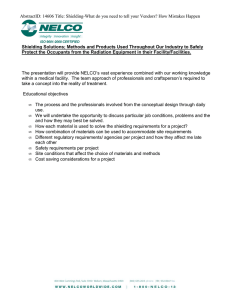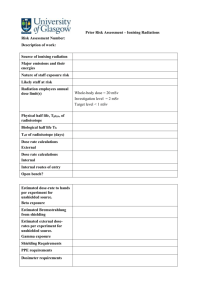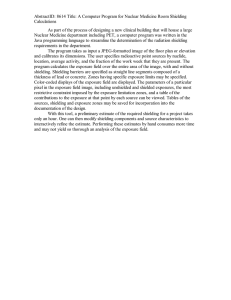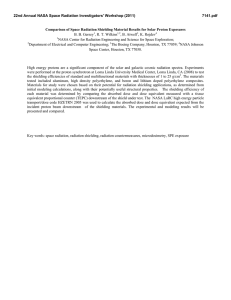working group 4 – s`cool lab - Indico
advertisement
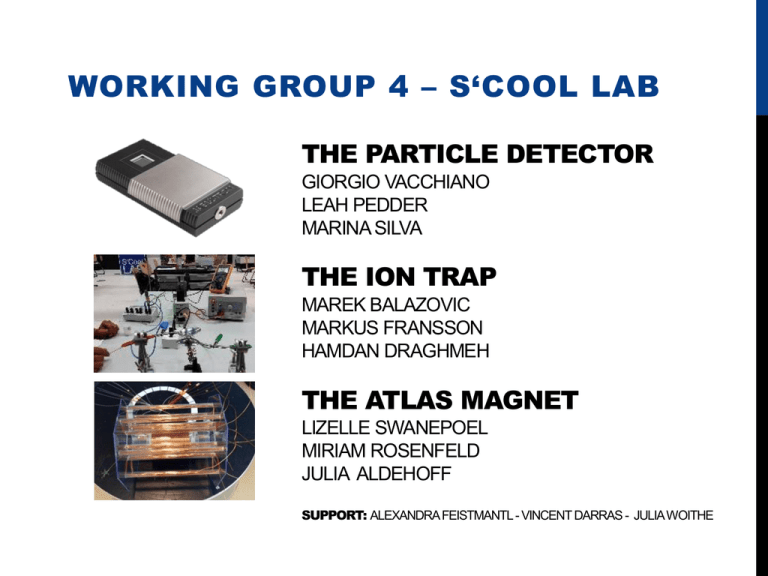
WORKING GROUP 4 – S‘COOL LAB THE PARTICLE DETECTOR GIORGIO VACCHIANO LEAH PEDDER MARINA SILVA THE ION TRAP MAREK BALAZOVIC MARKUS FRANSSON HAMDAN DRAGHMEH THE ATLAS MAGNET LIZELLE SWANEPOEL MIRIAM ROSENFELD JULIA ALDEHOFF SUPPORT: ALEXANDRA FEISTMANTL - VINCENT DARRAS - JULIA WOITHE PARTICLE DETECTOR HST 2015 GIORGIO VACCHIANO (IT) LEAH PEDDER (USA) MARINA SILVA (PT) SUBJECT Particle camera MX-10 JABLOTRON BASED ON PIXEL DETECTOR IN LHC http://www.jablotron.com/en/about-jablotron-1/aboutus/international-cooperation/jablotron-mx-10-1.aspx • Characteristics • Edu-kit SOFTWARE CURRICULA USA PORTUGAL ITALY AGE 15-18 13-14 18-19 COMPULSORY No Yes No CONTENTS Electromagnetic spectrum Energy Nuclear physics Modern physics Electromagnetic spectrum Tecnology and equipment using radiation Electromagnetic spectrum Nuclear physics Radioactivity STUDENTS’ CONCEPTIONS • Don’t know the meaning of “radioactivity”, misunderstanding with radio waves • “Radiation” has a frightening conotation • No natural sources emit radiation, only the industrial because radiation is artificial • There is no background radiation, we live in a free radiation environment • Radioactivity is unstoppable • Natural radiation is different from the one from radioactive sources • Radiation is carried by the wind • Radiation is danger because it is invisible • Irradiation of objects results in radioactive objects OUR PROPOSAL Shielding test • Al shielding • Pb shielding • Paper shielding • Distance • Thickness of Al Tape X-rays PROTOCOLS Aluminium foil SHIELDING TEST Paper Radioactive source Aluminium shielding Lead shielding SHIELDING TEST Without shielding With shielding SHIELDING TEST Without shielding With paper shielding SHIELDING TEST Total energy as function of distance to the source of radiation Total energy (keV) 250000 y = 160959x-1.81 R² = 0.9306 200000 150000 100000 50000 0 0 2 4 d (cm) 6 SHIELDING TEST Total energy (keV) Total energy as function of thickness of aluminum foil 50000 45000 40000 35000 30000 25000 20000 15000 10000 5000 0 y = -4337.6x + 51634 R² = 0.9686 0 1 2 3 Al foils 4 5 SHIELDING TEST Total energy with different shielding 250000 Energy (keV) 200000 150000 100000 50000 0 none paper Al sheet Pb sheet background SHIELDING TEST Number of particles detected with different shielding 350 a b g 300 No. particles 250 200 150 100 50 0 none paper Al sheet Pb sheet background TAPE X-RAYS TAPE X-RAYS TAPE X-RAYS Gamma particles 14000 12000 10000 8000 6000 4000 2000 0 Energy (KeV) ALTERNATIVE • Android app for comic rays detection • http://wipac.wisc.edu/deco • App with built in particle detector • https://youtu.be/9ibceYbzScw SOURCES • Sticky tape generates X-rays, Nature, 22-oct-2008 • • http://www.nature.com/news/2008/081022/full/news.2008.1185.html Becky Parker • • You’re never too young to be a research scientist • TEDxCERN • https://www.youtube.com/watch?v=MTv1N-BLTiM Eijkelhof, H. (1990), Radiation and risk in physics education • • http://rpd.oxfordjournals.org/content/68/3-4/273.full.pdf+html Neumann, S. (2014). Three Misconceptions About Radiation – And What We Teachers Can Do To Confront Them. The Physics Teacher, 52, doi:10.1119/1.4893090 • • http://scitation.aip.org/docserver/fulltext/aapt/journal/tpt/52/6/1.4893090.pdf?expires =1437573291&id=id&accname=2098973&checksum=8E4CFEB927CAA55165B594 7116D63681 Rego, F. & Peralta, L. (2006). Portuguese students’ knowlodge of radiation physics. Physics Education, 41 (3). • http://iopscience.iop.org/0031-9120/41/3/009/pdf/0031-9120_41_3_009.pdf DISCUSSION TIME 1! Cern HST 2015, Workgroup 4, Hands on activities ION Cheese Hamdan.daraghmeh@yahoo.com balazovicm@gmail.com markusfranssonph@gmail.com Trap Marek Balazovic, Markus Fransson, Hamdan Draghmeh What is an iontrap? A quadrupole ion trap Its also called "Paul" traps in honor of Wolfgang Paul. Shared the Nobel Prize in Physics in 1989 for this work Applications Iontrap had been used in Mass spectrometry (MS) Trapping antimatter In CERN experiments such as ATHENA and ALPHA. Iontrap was evolved to capture and trap the antimatter. Demonstration example Why our project? (www.newtonianlabs.com) $ 7490… Why our project? Make this cheap and visible and easy to build Types of simple traps • The RING trap • The LINEAR trap Our setup alternating 1 mA => slight tingle 10 mA => respectable shock 100 mA => possibly lethal Our setup Physical principle Physical principle Almost homogeneuos electric field to balance gravity Results Results Questions/Tasks for students Connections with Curriculum • Electric field Basic characteristics of electric field, electric charge, electric force, electric lines • Harmonic oscillation • Modern physics Antimatter, Mass-spectroscopy METHODS • Interactive demonstrations • Students project Questions/Tasks for students • Measure the weights of the spores • What do you see in the trap? (points or lines) Why? • How does the HV/AC affects the movement of the particles? • What would happen if the i) Diameter of the ring is increased? ii) Voltage [DC] is increased? iii) DC supply is switched off? iv) frequency of AC is increased/decreased? • How can particles sometimes move slow? And that´s all for this HST! DISCUSSION TIME 2! Appendix 1. Draw E-field Forces on ions! 2. What will the motion be like? Physical principle ATLAS magnetic field model Lizelle Swanepoel Miriam Rosenfeld Julia Aldehoff Workgroup Ingredients • We built a 1:100 model of the Atlas magnet system • • • • • • • • • Coppe r wire Plexiglass cutouts 16 plexiglass tubes (1x25 cm ) 1 plexiglass tube (7.5x25 cm ) 1 plexiglasstube (6x15 cm ) Compass needles Cables Transformer Connectors Working Magnetic components • Picture of the solenoid The final model The final model Introducing the activity http://www.atlas.ch/photos/lhc.html http://www.voxeurop.eu/files/the_independent.750.jpg Model vs. reality toroid magnets solenoid magnet Picture of the model different coils 2 magnetic fields solenoid and toroid Picture from Bernhard Holzer‘s presentation Lab circus to study magnetic fields 1 bar magnet made with persint Solenoid model https://commons.wikimedia.org 2 bar magnets https://commons.wikimedia.org 1 coil 1 wire 1 loop of wire http://www.cibermitanio s.com.ar/2008/05/10simulaciones-fisicasasombrosas.html http://www.physics.ucla.edu https://commons.wikimedia.org http://www.askamathematician.com http://www.trincoll. edu/~cgeiss/stuff/th e%20rocky%20road/ ch_1/ch1_p1.htm Advanced experiments • 2 experiments to show how charged particles (e-) react in a magnetic field • these illustrate the fundamental principle of deflection using appropriate hand rules http://www.dieter-heidorn.de/Physik/VS/StrukturMaterie/K08_Elektronen/ K08_Elektronen.html Particle deflection in ATLAS detector • Simulation of the electron and positron • Prediction with the Lorentz-force http://atlas.physicsmasterclasses.org/en/wpath_teilchenid1.htm Particle deflection in ATLAS detector • Deflection of the muon is more complex http://atlas.physicsmasterclasses.org/en/wpath_teilchenid1.htm A simulation for the toroid field made with persint A simulation for the toroid field made with persint Measurement of the magnetic field • Different methods to use: ▫ ▫ ▫ ▫ Compasses Magna Probe (3D-compass needle) Smartphone app (teslameter) Hall-Probe (exact magnetic field strength in Tesla) Curricular context • Period ▫ 11th or 12th grade • Topic ▫ Electrodynamics ▫ particle physics (consolidating previous and extending knowledge) https://encrypted-tbn1.gstatic.com/images?q=tbn:ANd9GcSSZh4lNd9wvZvJcG3ytWFp4NHOj9hrrXDlH-PuGQns-KcDzlm7Rg List of references • ATLAS animation: http://atlas.physicsm asterclasses.org/en/w path_teilchenid1.htm • Persint: http://irfu.cea.fr/Pho cea/Vie_des_labos/As t/ast_sstechnique.php ?id_ast=3113 Thank you for your attention! Any questions?
